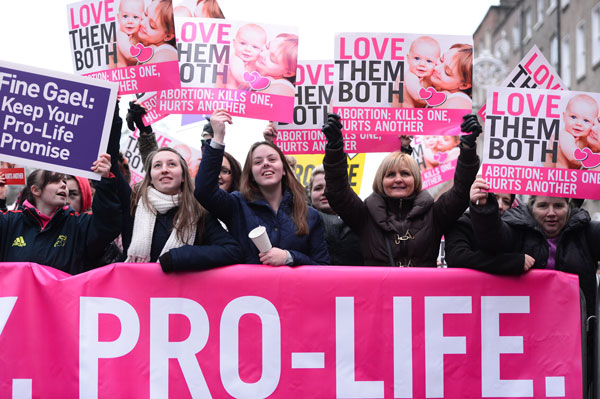The Pro Life Campaign has strongly criticized both parties in Government for engaging in “face-saving wrangling” on the abortion issue. This is in response to newspaper reports today about the number of doctors that would sit on the panel to adjudicate on when an abortion can be carried out on grounds of threatened suicide.
The reports claim that the Fine Gael party is insisting on six doctors – two obstetricians and four psychiatrists while Labour has said that they want abortion to be more easily accessible. On Friday, the Pro Life Campaign welcomed all nine of the recommendations from the inquest into the tragic death of Savita Halappanavar, including the call for Guidelines providing clarity for doctors in relation to necessary medical interventions in pregnancy.
 Commenting on today’s newspaper reports on the disagreements in government over any proposed abortion legislation, Caroline Simons, Legal Consultant to the Pro Life Campaign said:
Commenting on today’s newspaper reports on the disagreements in government over any proposed abortion legislation, Caroline Simons, Legal Consultant to the Pro Life Campaign said:
“If there are any difficulties in government in reaching agreement on abortion legislation, they stem from the fact that Fine Gael capitulated to the Labour Party last December when they agreed to introduce abortion on the grounds of threatened suicide.
“It is all but irrelevant how many psychiatrists or obstetricians are on the panel that decides when a baby’s life can be ended. The real issue here is that X Case legislation would for the first time permit the direct targeting of the lives of unborn children, including in threatened suicide situations even though all of the research to date shows that abortion is not a treatment for suicidal feelings.
“It was entirely predictable that the Labour Party would criticize any legislation as too restrictive. It is also highly likely that Labour will give some ground to Fine Gael on this but any compromise will be meaningless as the right to life will already have been conceded.
“Once the legislation is passed, the Labour Party and others will continue to ridicule the law and call it unworkable knowing that abortion is now permissible and that it is only a matter of time before the grounds are widened.
“Rather than facilitating this smokescreen, the Fine Gael party needs to challenge Labour over the justification of proceeding with abortion legislation on grounds of threatened suicide when the research shows that abortion is not an appropriate treatment for suicidal ideation and has potential to cause severe adverse mental health consequences for women.”
There have been numerous studies that found an association between abortion and suicide. Other studies have found a link between abortion and depression (which is a major risk factor for suicide). For example:
A 1995 study by A.C. Gilchrist in the British Journal of Psychiatry found that in women with no history of psychiatric illness, the rate of deliberate self-harm was 70 percent higher after abortion than after childbirth.
A 1996 study in Finland by pro-choice researcher Mika Gissler in the British Medical Journal found that the suicide rate was nearly six times greater among women who aborted than among women who gave birth.
A 2002 record-linkage study of California Medicaid patients in the Southern Medical Journal, which controlled for prior mental illness, found that suicide risk was 154 percent higher among women who aborted than among those who delivered.
A March 2004 report from the National Institutes of Health revealed that suicide is now the third leading cause of death among America’s young people. In fact, for teen girls and young women, the suicide rate has tripled over the past 25 years.
While suicide among women in the typical abortion age range is rising, suicide rates for Americans in general are dropping across the country.
Dr. David Reardon, director of the Springfield, Illinois-based Elliot Institute, says abortion is partly to blame for the increase.
“Given the fact that more than half of all women having abortions are under the age of 25, and more than 20 percent of women having abortions are teenagers, the increased suicide rate among teens and young women is sadly not a surprise,” Reardon said.
One study published in August 2003 edition of the British Medical Journal found that women who had abortions were seven times more likely to commit suicide than women who gave birth.
Reardon says unwanted abortions are a reality for teens and young women who are often pressured by boyfriends or parents to have abortions. e says as many as one in six abortions are performed as a result of such coercion and a study the Elliot Institute conducted among women experiencing post-abortion problems reveals that 80 percent said that would not have had an abortion if they had received support from others to have the child.
“Even if their families might give them the support they need to have their babies, many teens often undergo secret abortions without telling their parents,” Reardon said. “Either way, these girls and young women often have no one to turn to when they are in despair over an abortion.”
Another Elliott Institute study also found that women who have abortions are more likely to commit suicide.
CLICK LIKE IF YOU’RE PRO-LIFE!
Reardon’s group examined Medi-Cal records for more than 173,000 low-income California women who had abortions or gave birth in 1989. Linking these records to death certificates, the researchers found that women who had state-funded abortions were 2.6 times more likely to die of suicide compared to women who delivered their babies.
The study also found that women who have abortions have a higher suicide rate than women in general. In fact, giving birth reduces women’s suicide risk, the study showed.
Other studies have found higher rates of depression, mental illness, miscarriages and substance abuse among post-abortive women compared to women who gave birth.







